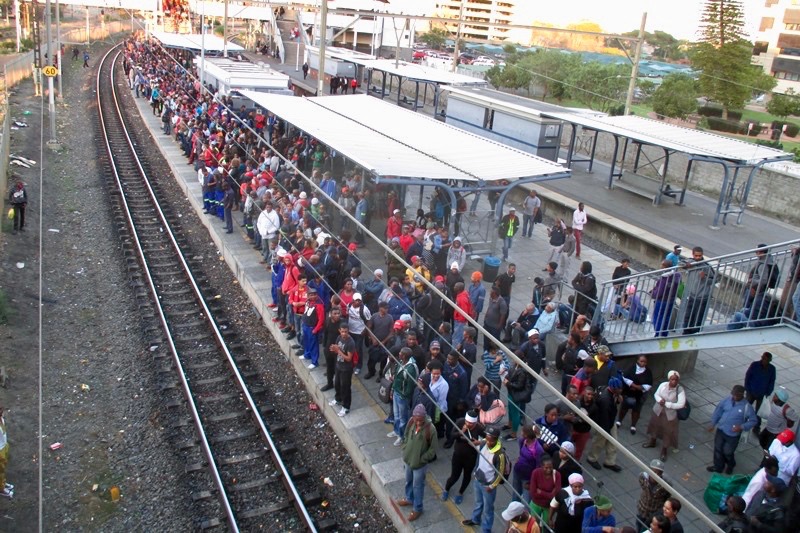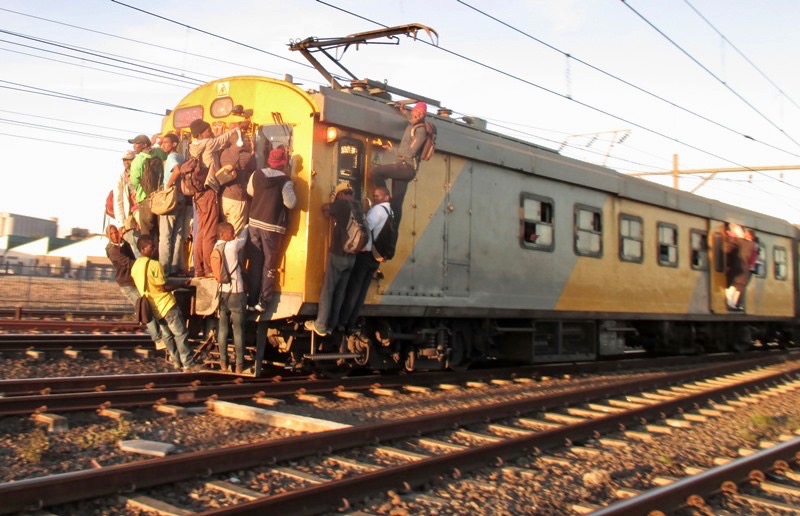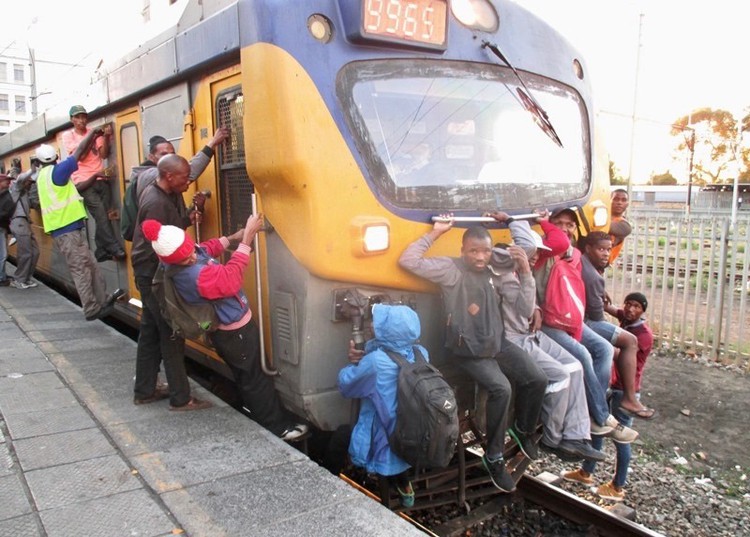Cape Town’s bursting trains
Commuters complain of overcrowded and delays
According to the TomTom traffic index Cape Town is the most congested city in the country and 48th in the world, ahead of cities such as New York. For rail commuters, the situation isn’t much better, with trains overcrowded to the point of bursting and long delays. GroundUp found people clinging from the outside to coaches and even locomotives. Some trains were only six coaches long.
Daphne Kayster, Western Cape PRASA (Passenger Rail Agency of South Africa) Acting Marketing and Communication Manager said the equivalent of 11 train sets were destroyed by arson between October 2015 and April 2017.
“The main reason for the dramatic decrease in train performance is directly related to pressure on the fleet due to losses from train fires as well as vandalism to the infrastructure as a result of arson and community protests,” she said.
“The demand for services far exceeds the available train supply as a result of decades of disinvestment in rail and unprecedented growth of informal settlements.
“The continuous theft or vandalism of assets, mainly cables and other metal bearing components has led to a situation where services have generally been unreliable and therefore not meeting customer expectations,” said Kayster.
Commuters, however, blame Metrorail for the increasingly poor service, and reports of corruption and mismanagement in PRASA lend weight to their view.
GroundUp spoke to a number of commuters. They said they arrived late for work and with winter arriving they returned home after dark making them vulnerable to criminals.

But that train is now so overcrowded he has to wait for the next one. He says his employers do not understand his difficulty and have issued him with harsh warnings. He tried getting an earlier train, but it was very often delayed.
Lucy Somtsewu, 41 of Gugulethu and a mother of two, travelled every weekday on a Cape Town-bound train for Mutual. She says the situation is now so bad that instead of her monthly R150 train ticket for Nyanga to Mutual Station she has to spend R32 a day on a taxi to get to work (R19 to Mutual and R13 for a return to Gugulethu).
Mavis Bhelesi, 58 and a mother of two, said it was usually only one day in a week that the trains were on time on her route of Nonkqubela Station (Site B, Khayelitsha) to Bellville.
“I was normally supposed to catch a 6am train and start work at 8:30am, but I am compelled to catch an earlier train because of the serious delays,” she said. “I have used trains for more than 30 years … but the issue appears too appalling nowadays … much worse since PRASA took over in the past few years.”
“The company’s personnel tell us to move to another transport mode every time we lodge complaints with them,” she said.

Commuters climbing on a Khayelitsha-bound train. Photo: Mandla Mnyakama
Correction: The article said Cuba tried catching an earlier 7:20am train; it should have read “an earlier train”
Support independent journalism
Donate using Payfast

Don't miss out on the latest news
We respect your privacy, and promise we won't spam you.
Letters
Dear Editor
Be brutally honest Prasa and do a SWOT analysis.
STRENGTH
An existing countrywide infrastructure.
WEAKNESS
Inadequate and substandard security in every aspect. Total lack of long term planning and vision for the future of Prasa. Poor maintenance and outdated replacement of assets. No countrywide training facilities or maintenance facilities. No dedication or pride within the operation by a vast majority of employees. Large scale abuse of assets and finances.
OPPORTUNITIES
The opportunity to turn the entire operation around. The chance to rebuild a commuting system that the public supports and have faith in. Massive job creation and infrastructure development countrywide. Financial generation leading to complete self sustainability. Reduction of commuter congestion and carbon footprint across the country.
THREATS
The inevitable collapse and loss of an entire commuting system. A different means of commuting offered to the public that is not a state entity. Living with the knowledge that the chance to turn the entire commuting system around to a positive experience has gone forever.
Personally, I don’t think the Gautrain is a world leader in commuting, but the entire operation proves that a good commuting service can be built.
Dear Editor
The challenge of SA's goverment is the order of priorities.
Rail Transport is most used by relatively poor working class for commuting to & from work yet there's significant underinvestment in it. Reducing incidences of train delays to copper theft is downright lazy thinking. This is has been there for years and what has this government done about it? In fact the very act damaging trains is due to repeated train delays.
I get a strong sense that this government dislikes the poor working class and yet these are the very same that vote for this ANC-led government. In a country such as ours that has legitimate often competing infrastructural needs, competing for state funding, makes for valid and compelling case to sell SAA and fix PRASA (am making references to SA government because both SAA & PRASA are state owned). This makes sense in a developing state as ours that has been battling with relatively high rates of unemployment and a significant infrastructural under-investment.
© 2017 GroundUp. 
This article is licensed under a Creative Commons Attribution-NoDerivatives 4.0 International License.
You may republish this article, so long as you credit the authors and GroundUp, and do not change the text. Please include a link back to the original article.

